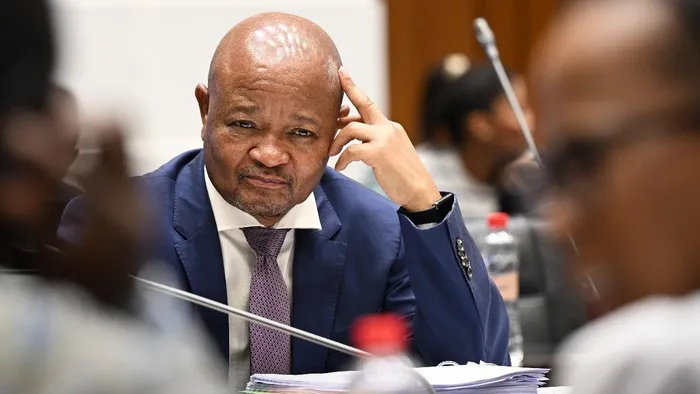ANC's renewal under scrutiny as Senzo Mchunu case raises questions over 'step-aside' policy

SUSPENDED: Police Minister Senzo Mchunu wants to step aside from ANC duties.
Image: HENK KRUGER Independent Media
The ANC finds itself embroiled in renewed debate over the efficacy and sincerity of its "step-aside" rule, following the announcement that suspended Police Minister Senzo Mchunu's offer to step aside from party duties was declined.
This decision, amid two ongoing inquiries into serious allegations against Mchunu, casts a long shadow over the party's much-touted renewal process, prompting critics to question if it is a hollow exercise selectively applied based on who faces allegations.
The ANC officially confirmed this week that Mchunu had expressed willingness to step aside from organisational work.
This followed the establishment of a judicial commission of inquiry by President Cyril Ramaphosa to investigate claims of Mchunu's interference in sensitive police investigations.
However, ANC Secretary-General Fikile Mbalula clarified that Mchunu’s offer was declined, allowing him to remain active in party affairs despite being on special leave from his Cabinet role.
The "step-aside" rule, an internal ANC policy adopted in 2017, mandates members charged with corruption or other serious crimes to voluntarily step aside from party and government activities or face suspension.
Mbalula's defense of the decision to allow Mchunu to remain active hinges on the fact that he has not yet been formally charged with a crime.
"The party’s commitment to accountability and ethical leadership is unwavering," said ANC national spokesperson Mahlengi Bhengu, highlighting Mchunu’s cooperation with both the Madlanga Commission and the party’s Integrity Commission.
Mchunu’s woes began in July 2025 when KwaZulu-Natal Police Commissioner Nhlanhla Mkhwanazi accused him of interfering in sensitive investigations, including disbanding the Political Killings Task Team and protecting individuals linked to corruption.
These claims led to Ramaphosa appointing retired Constitutional Court Justice Mbuyiseli Madlanga to lead the Judicial Commission of Inquiry into Criminality, Political Interference and Corruption in the Criminal Justice System.
National Police Commissioner Fannie Masemola has testified before the Madlanga Commission, describing Mchunu’s directive to disband the task team as “suspicious and questionable".
Mkhwanazi’s allegations further implicate Mchunu in colluding with businesspeople and shielding corrupt officials.
The DA has further asserted that Mchunu is under criminal investigation.
Despite the gravity of these allegations and ongoing inquiries, Mchunu maintains his innocence, stating that he briefed Ramaphosa on the issues as early as January or February 2025.
He also revealed that his initial offer to step aside from ANC duties was turned down by Mbalula, underscoring his commitment to clearing his name.
The ANC's handling of Mchunu’s case has reignited fierce debate about the consistency of its step-aside rule.
Critics, including opposition parties, argue that the policy is applied selectively, raising questions about the ANC’s genuine commitment to rooting out corruption within its ranks.
Political Analyst Metjie Makgoba said that the Mchunu saga presents a critical test for the ANC's stated commitment to ethical renewal under Ramaphosa.
“The decision to decline Mchunu's offer to step aside, despite the ongoing Madlanga Commission and the party's own Integrity Commission investigating serious allegations, creates a perception that the "step-aside" rule is not applied uniformly,” he said.
“The ANC's stance that Mchunu has not been "criminally charged" appears to be a convenient loophole, allowing politically powerful figures to remain active while under a cloud of serious allegations. This approach risks undermining the very essence of the renewal process, which aims to restore public trust in the party. If the party only acts decisively once formal charges are laid, it suggests a reactive rather than proactive approach to ethical governance,” he said.
Maokgoba said the selective application of the rule would lead to inevitable questions on whether the ANC's renewal process is merely a hollow exercise, dictated by the political influence and loyalty of those facing accusations rather than a genuine commitment to combating corruption and upholding ethical leadership?
Another political analyst Dr John Molepo said that the ongoing tension within the ANC regarding Mchunu's situation underscores deep divisions and the challenge of implementing reforms consistently.
“While party insiders suggest Mchunu’s continued involvement is due to his long-standing loyalty and influence in KwaZulu-Natal, this explanation further reinforces the perception of preferential treatment,” he said.
“For the ANC to truly demonstrate its commitment to renewal, it must address the perception of selective justice and apply its own rules consistently, regardless of an individual's political standing or influence. Failure to do so risks alienating both its members and the broader South African public, ultimately rendering its renewal efforts a mere façade. The outcome of the Madlanga Commission, and the ANC's subsequent actions, will be a crucial indicator of the party's genuine intent to rebuild its integrity,” Molepo said.
mashudu.sadike@inl.co.za
Related Topics: